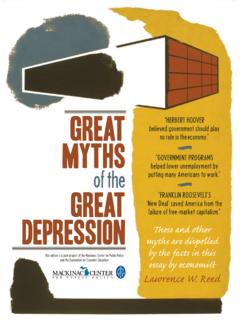Transcription of WHAT IS INTERPERSONAL COMMUNICATION - crnb-rcnb.ca
1 WHAT IS INTERPERSONAL COMMUNICATION ? Almost every problem, every conflict and every misunderstanding has at its most basic level an INTERPERSONAL COMMUNICATION problem. So, what is INTERPERSONAL COMMUNICATION ? Think for a moment and write down the words that come to your mind when you think of INTERPERSONAL COMMUNICATION WHAT IS INTERPERSONAL COMMUNICATION 1 INTERPERSONAL COMMUNICATION IS HUMANITY S GREATEST ACCOMPLISHMENT INTERPERSONAL COMMUNICATION is humanity s most important characteristic and its greatest accomplishment. It is humans ability to turn meaningless grunts into spoken and written words, through which they are able to make known their needs, wants, ideas and feelings. INTERPERSONAL COMMUNICATION is a complex process that can be described in simplified terms by a Sender and a Receiver who exchange messages containing ideas and feelings, mixed together.
2 The Sender encodes the messages using Verbal, Vocal and Visual elements. The words form the Verbal element. The Vocal element includes the tone and intensity of our voice and the music of our language . The Visual element incorporates everything the Receiver can see. It might be a surprise to you but the Visual, non-verbal element is the most powerful element, grabbing and holding Receiver s attention. Vocal and Verbal elements follow. The Receiver takes in the messages and decode them by sorting out and interpreting the elements according to their own experiences, beliefs and needs. WHAT IS INTERPERSONAL COMMUNICATION 2 WHY DO WE NEED INTERPERSONAL COMMUNICATION ? We cannot be human alone. We live in a world filled with other people.
3 We live together, work together and play together. We need each other for security, comfort, friendship and love. We need each other to mature through dialogue. We need each other to achieve our goals and objectives. None of these needs could be addressed without INTERPERSONAL COMMUNICATION . We communicate in order to: Get acquainted Express emotions to others Share information Persuade others to understand our personal views Build relationships INTERPERSONAL COMMUNICATION is the lifeblood of every relationship. Good relations are nurtured by open, clear and sensitive COMMUNICATION . We are able to send messages from the moon, but we find it difficult to relate to those we love. Ineffective COMMUNICATION causes loneliness, conflicts, family problems, professional dissatisfactions, psychological stress, physical illness and even death, when COMMUNICATION breaks down.
4 Emperor Frederick, the 13th century ruler of the Holy Roman Empire wanted to know what language had been spoken at the birth of mankind in the Garden of Eden. Was it Hebrew, Greek or Latin? He ordered an experiment in which the original circumstances would be recreated as closely as possible. A group of infants were to be isolated from hearing human speech from the moment of birth until they spoke their language. The babies were to be raised by nurses who were strictly charged to maintain complete silence when with the babies. The result? Every one of the babies died. The lack of COMMUNICATION can be lethal. From Robert Bolton, People Skills WHAT IS INTERPERSONAL COMMUNICATION 3 CAN WE IMPROVE OUR COMMUNICATION SKILLS? It would be a perfect world if COMMUNICATION would work as in the Science Fiction movie Star Trek , where Mr.
5 Spock, by touching skulls, transferred information from one mind to another in a faultless process free of errors, emotional content and personal perspectives. Unfortunately in our world, mind melting is not available. We have to struggle with an imperfect system containing considerable opportunities for COMMUNICATION breakdowns. Many people are fatalistic about their COMMUNICATION skills. We hope you are not one of those who tend to think that the way they talk and speak is a given like the color of their eyes. We believe the opposite and hope to be able to persuade you that: Everyone can learn to communicate more effectively Everyone can change. Actually change is inevitable, so everyone will change. People change continuously from infancy to old age.
6 And the law of change says: Things do not stay the same. If they don t get better, they get worse . If the conflict does not decrease it will escalate. If relationships do not get stronger, they will get weaker. If the relations do not become closer, they will become more distant. If the relations do not become more productive, they will become less productive. It is important to have the COMMUNICATION skills to manage changes than to let them happen to you. People who understand the COMMUNICATION process have more control over it and fewer breakdowns. This handbook will help you foster the kinds of changes you desire by improving your understanding of the INTERPERSONAL COMMUNICATION process, focusing on: - COMMUNICATION Roadblocks o The way our minds work o Sender s behaviors o Receiver s behaviors - How to overcome COMMUNICATION Roadblocks by o Listening, Listening, Listening o Reading, Reading, Reading body language o Speaking o Skill Training WHAT IS INTERPERSONAL COMMUNICATION 4 COMUNICATION ROADBLOCKS Understanding Problem Areas where COMMUNICATION can break down THE WAY OUR MINDS WORK Perceptions of the reality Perceptions are the way we interpret and understand the reality.
7 Perceptions form our reality through the following steps: We collect information But: - We collect only a small amount we can not register all the data that our senses can bring us - We collect selectively we see what we want to see, we look for data to support our initial assumptions and neglect or do not notice contradictory evidence - We collect in a certain order The picture below is a well-known ambiguous picture. It can be seen as a young girl or as an old woman. Hofstede describes how he showed half of a class a slightly altered version of the picture, for only five seconds, in which only the young girl could be seen. He then showed the remaining members of the class another version of the picture, again only for five seconds, in which only the old woman could be seen.
8 After this preparation he showed the full ambiguous picture to everyone. The results were amazing. Most of those conditioned by seeing the old woman saw only the old woman and those conditioned by seeing the young girl saw only the young girl. He than asked each group to try to help the others to see what they saw until everyone saw both images. Each group get its views across the others with great difficulty and considerable complaints about each others stupidity. From Charles B Handy, Understanding Organizations We arrange the information into categories Categorizing is very useful, being a way of organizing the chaotic reality to understand it. But Categorizing is dangerous, for with categories go a certain set of assumptions or predictions: Blonds are stupid Brown-skinned men are violent Old people are less ready to change.
9 These are the stereotypes. WHAT IS INTERPERSONAL COMMUNICATION 5 We form our reality But Each of us may have his/her own reality, very different perceptions and very different realities. These differences often cause misunderstandings and conflicts. Have you ever heard about Red Riding Hood fairy tail? We suppose, yes. Have you ever listened to the Wolf? We suppose, no. Please take a moment to listen to him. The forest was my home. I lived there and I cared about it. Then one day, while I was cleaning up some garbage a camper had left behind, I heard footsteps. I leaped behind a tree and saw a little girl coming down the trail carrying a basket. I was suspicious of her right away because she was dressed funny all in red and with her head covered up so it seemed like she didn t want people to know who she was.
10 Naturally I stopped to check her out. I asked who she was, where she was going, where she had come from, and all that. She turned up her nose and told me she was going to her grandmother house. As she walked down the path she took out a chocolate bar out of her basket and started to eat it, throwing the paper on the ground. Imagine that! Bad enough that she had come into my forest without permission and had been rude to me. Now she was littering my home. I decided to teach her a lesson. I ran ahead to her grandmother s house. When I saw the old woman I realized I know her. Years before, I had helped her get rid of some rats in her house. When I explained what had happened she agreed to help me teach her granddaughter a lesson.






